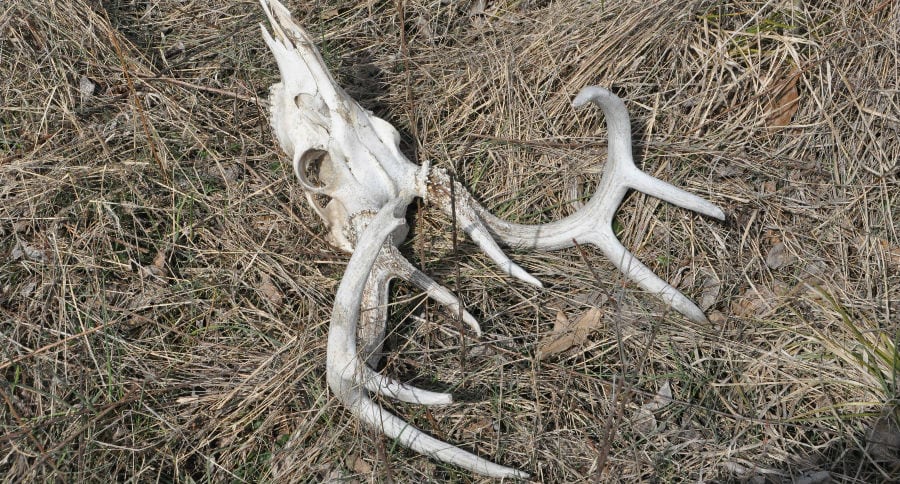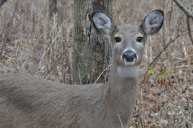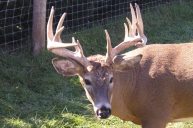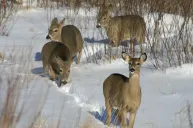Michigan moves forward with more CWD-influenced regulations.
The Michigan Natural Resources Commission is moving forward with some of their most extreme regulations for managing chronic wasting disease during the 2018 hunting season.
The Michigan Department of Natural Resources announced the regulation changes in a press release. They intend to combat the spread of the deadly neurological disease that infects members of the deer, elk and moose families.
Officials have confirmed approximately 60 deer as CWD-positive since the discovery of the disease in a wild deer in the Great Lakes State in 2015. The disease has only surfaced in six counties, but 16 different counties are currently feeling the effects of "CWD containment zones."
"We hope that by setting these specific CWD regulations, we can limit the movement of this disease in Michigan," NRC chairperson Vicki Pontz said in the DNR press release.
So what do you need to know for the 2018 season? Quite a bit as it turns out. Here's the rundown straight from the DNR press release:
- Reduced the 4-point on-a-side antler requirement on the restricted tag of the combination license in the 16-county CWD Management Zone. Under the new regulation, a hunter in the CWD Management Zone can use the restricted tag of the combination license to harvest a buck with antlers as long as it has at least one 3-inch antler.
- Created a discounted antlerless license opportunity in the CWD Management Zone on private land; if purchased, the license will expire Nov. 4, 2018.
- Effectively immediately, a statewide ban on the use of all natural cervid urine-based lures and attractants, except for lures that are approved by the Archery Trade Association.
- An immediate ban on baiting and feeding in the 16-county area identified as the CWD Management Zone. This area includes Calhoun, Clinton, Eaton, Gratiot, Hillsdale, Ingham, Ionia, Isabella, Jackson, Kent, Mecosta, Montcalm, Muskegon, Newaygo, Ottawa and Shiawassee counties.
- A ban on baiting and feeding in the Lower Peninsula, effective Jan. 31, 2019, with an exception to this ban for hunters with disabilities who meet specific requirements. The start date on this regulation is intended to allow bait producers and retailers time to adjust to the new rule.
- Effective immediately in the CWD Management Zone and four-county bovine tuberculosis area (in Alcona, Alpena, Montmorency and Oscoda counties), hunters with disabilities who meet specific requirements can now use 2 gallons of single-bite bait, such as shelled corn, during the Liberty and Independence hunts.
- Allowance of all legal firearms to be used in muzzleloader season in the CWD Management Zone.
- A purchase limit of 10 private-land antlerless licenses per hunter in the CWD Management Zone.
- Restrictions on deer carcass movement in the five-county CWD Core Area (Ionia, Kent, Mecosta, Montcalm and Newaygo counties) and the CWD Management Zone.
- Antlerless options on deer licenses/combo licenses during firearms seasons in the five-county CWD Core Area.
- An experimental mandatory antler point restriction regulation in a five-county CWD Core Area, including Ionia, Kent, Mecosta, Montcalm and Newaygo counties. The restriction would begin in 2019, provided a survey of hunters shows support for the requirement and specific department guidelines are met.
The press release also states there will be unspecified changes to requirements for wildlife rehabilitators and unspecified expansions of early and late antlerless deer seasons in select counties.
Many of the regulations, such as the ban on deer urine attractants, mirror similar regulations going into effect for other states trying to fight the spread of CWD.
The Natural Resources Commission is also asking the DNR to move forward with some new antler point restrictions.
- A hunter-submitted proposal for mandatory antler point restrictions in Huron, Tuscola, Sanilac, St. Clair and Lapeer counties. If hunter surveys support this regulation and specific department guidelines are met, it would be implemented in 2019.
In spite of increased worries about CWD, the DNR is encouraging hunters to continue hunting and to also test all their harvests for the disease. They also want to make sure hunters are aware of regulations regarding which deer parts hunters can legally bring into Michigan from out of state and how.
The Michigan DNR has been cracking down on high-fence game ranches in recent years in an apparent attempt to help slow the spread of the disease. In one case, a game ranch owner received jail time, fines and community service back in April after officials say the man falsified testing information on his captive herd and for failed to maintain the fences at his ranch.
NEXT: MICHIGAN GAME RANCH OWNER SENTENCED FOR FALSIFYING CWD TESTING INFO
WATCH
https://rumble.com/embed/u7gve.v3tr93/




